Text
I've been mulling something over and I feel like sharing it, so here we go. Heads up: It's going to be long and it's going to involve the movie Poor Things, and there will be some discussion of sexual assault later on.
The phrase "art should comfort the disturbed and disturb the comfortable" gets tossed around a lot online from what I've seen. However, it seems that this has become shorthand for "if something makes you feel disturbed or disgusted, it must be good art". This has become a linchpin in pretty much every argument I've seen about how to interpret Poor Things.
I take issue with this. Yes, an artist can use their medium to illicit a feeling of disgust or disturbance in their audience to get a point across about the scenario they're presenting. Making someone complicit in the disgust of a disgusting situation that they otherwise may never experience or think about in their lives can be a very powerful way to communicate with an audience. It can also be a powerful way to reframe situations that the audience might not have previously been bothered by because they never saw a reason to be. However, not all disturbing media is inherently deep or meaningful just because because it invokes "negative" feelings.
It seems like people are forgetting that things like erotica/pornography and slasher films exist. I know some will bristle at the notion of including literal porn in this conversation, but bear with me. Sometimes the purpose of "gross" media is literally to experience and engage with a feeling, not go spelunking into social philosophy. Many people enjoy slasher films because they enjoy the rush of disgust and shock. It can be fun if you're the kind of person who enjoys that. Same thing with erotica and porn. Many people enjoy that because at the time they're viewing it they want to engage with feelings of arousal, romance, and/or intrigue. These are also completely valid reasons to consume media. There's nothing wrong with it. But the fact that you feel a feeling doesn't actually mean that some deep philosophical lesson has been imparted. Sometimes feelings are just feelings.
In my personal opinion, the "disturbing" content in Poor Things was gratuitous and ineffective. Using the initial premise of a baby's brain inside an adult woman's body and then having nearly all of the resulting person's entire character arc revolve around some bizarre interpretation of sexual liberation was tactless and out of touch. I have seen some people try to justify that this was actually the point of the movie: the way that a morally deranged and misogynistic society sexualizes immature young women and girls, or the way that women in general are infantilized and their struggle to gain sexual agency. However, I personally do not think that this was effectively conveyed if that was the goal. I also do not think that was the goal.
Lead actress Emma Stone describes the movie as a "romantic comedy". When asked about the sexual nature of the character she plays, Stone says:
"Because she’s so free, because she lacks that shame about anything—eating, drinking, the way she’s taking in the world, her relationships to other people, her environment, sexuality—for me it was a really freeing experience. As a woman in the world as we know it, and as an American woman also, it was a really freeing thing to think if I didn’t have judgment around my body or around my sexuality. That’s one of the reasons why I love the way that this is shot and that the story is told, because the camera’s also not saying, Oh, well, now we should look away because we know in our society that this is something that shouldn't be seen. None of this would be embarrassing to her or something that she would think was shameful in any way."
In another interview, the director himself describes his work like this:
“Shame is one thing that we are conditioned to feel in certain situations and Emma’s character doesn’t have that. She never got to know what shame is, so she is totally free to give her mind, her thoughts, her opinions, her body, whatever.” He goes on to describe the story being about, "a human being that has a second chance in the world, someone who hasn’t been moulded in a very specific manner to perceive the world in a certain way. She gets to start clean, and that gives her a far freer view of things. She’s a 28-year-old woman who, up until then, had lived a life that obviously didn’t satisfy her. And she comes back with a blank slate, able to start again, and to own that life.”
Unless the cast and crew are lying as part of some elaborate performance art piece on the acceptability of sexualizing children in society and media, it seems like maybe their message was more about the impact of socialization and the way it controls us and restricts our behavior. That isn't to say that seeing a criticism of misogyny, sexualizing children, and the infantilisation of women isn't a valid personal interpretation. You are not required to take the creator's intent into account when interpreting media for yourself and deciding what it means to you individually. However, that is only one approach to analyzing media and calling those who do factor in the creator's intent when assessing their work "media illiterate" is... Not It™. Yes, art is meaningful to individuals in different ways and each person will approach a piece of art with their own unique blend of personal experiences and opinions that will make it more or less meaningful to them regardless of what the creator's intended. But art is also a communication, not least of which between the artist and the audience, and not every attempt at communication is effective. Sometimes it is downright blundering.
I could go on for hours about the eroticism of childishness in Poor Things. Even more telling perhaps, I could go on for days about the public response to the eroticism of childishness in Poor Things, especially the droves of fans chomping at the bit to declare the film a satirical masterpiece on that very topic. Unfortunately, however, it seems to me that any commentary on the subject of sexualizing children was unintentional. I choose to read a hopeful message into this situation by imagining that those who see this commentary as the point of the film saw the uncomfortably obtuse pedophilic overtones in the premise and could not imagine that the creators did not realize it was there. The subsequent search for meaning resulted in this "criticism of toxic and pedophilic misogyny" interpretation rather than the less pleasant alternatives: either that the sexualization of the child was simply a throwaway plot element, or worse, that the creators simply do not see a problem with sexualizing children and/or children's behavior. For the sake of being charitable, I posit the former: that the sexualization of childishness in Poor Things was at least partially the unintentional result of a badly handled plot point. I believe this because any time I see it brought up to anyone who worked on the movie, the conversation is immediately pivoted to how free and uninhibited Bella is. The fact that she's a child in an adult woman's body is glazed over almost entirely. When it is discussed, as in the quote above by the director, it seems that it was merely the mechanism by which they obtained an adult woman with a "clean slate", socially and mentally speaking, which was the perspective they wanted to use to examine how socialization impacts the way that humans interact with the world and with each other. In particular, the director seems to take the position that socialization is largely oppressive, especially to women's sexual agency.
The topic of the potentially oppressive nature of socialization is too big for me to handle here. I will say that I don't entirely disagree with the director, but that it is an incredibly complex subject that isn't easy to wrangle. The question of whether or not Poor Things sends an effective message about women's sexual liberation in relation to socialization is a bit more straightforward to me: I think it failed.
We live in a society that heavily restricts women's sexuality, that's true. The knee-jerk reaction to this is to imagine that a sexually liberated society would allow women to have as much sex as they want without shame or stigma. In theory, I agree. However, the film seems to take the position that without the oppression of society, nobody would ever turn down sex and that is where I have to disagree. Foundational to women's sexual liberation is the ability to say yes or no to sex and have that choice be respected. Yet at no time do we see Bella Baxter turn down sex. We see her spit out food that she doesn't like mid-chew. We see her end a relationship with a man that she's grown bored of (and their sexual relationship ends by default). But we never see her call off a sexual encounter because she isn't enjoying it the same way she calls off the other unpleasant experiences that she is shown engaging with on screen. In fact, when she does start having less enjoyable sexual experiences with men that she's uninterested in, she starts contriving ways to make unenjoyable sex more enjoyable rather than leaving and finding something more fulfilling to do or even just someone more pleasant to have sex with.
Perhaps that was also an unintentional oversight in her character development or perhaps it was a fully intentional comment on seeing the positive in situations rather than focusing on the negative. Even so, I find the "sex is like pizza: even when it's bad, it's still good" perspective to be far from feminist or empowering. In fact, it echoes the juvenile and misogynistic claims of rape deniers who say that it's better to just lay back and enjoy sex even if it wasn't what you wanted. The further implication of this being that sexual trauma is your choice because you could just choose to enjoy it instead. Additionally, claiming that the only reason a woman would choose not to enjoy sex is because of socially imposed shame is insultingly simplistic. At the very least, it's an insult to survivors of marital rape who were forced to have sex under otherwise socially acceptable circumstances that do not engender shame by default. Our bodies are part of who we are as a whole; they are ours and they are us. It's the part that we use to physically interact with the world and the people around us. Having our bodies used by someone else against our will is always harmful to some degree.
My takeaway is that Poor Things was a visually intoxicating crime of passion that fools its audience into thinking it's more profound than it actually is with clever camera work and an overabundance of shock value. It fails to convey what seems like the obvious message because the obvious message is an accident. Then it continues to fail at conveying its intended message because it treats its own themes so superficially that despite giving itself more than enough time to delve deeply into its subject matter, Poor Things spends an unnecessary amount of screentime treading the same ground and making no real progress. Events that should be more meaningful to her character development like being exposed to suffering and slavery end up having a negligible impact on the story. Instead the audience is just subjected to a gratuitous number of awkward sex scenes that claim to explore themes of self-discovery and sexual liberation but which manage to say nothing significant on either topic (at least not significant enough to justify the two and a half hour runtime).
Poor Things almost completely neglects to include any element of this in it's discussion of sexual liberation. The closest thing we get is at the end of the movie where Bella's father/husband (who still exclusively sees her as his wife even after the situation is explained) threatens to have her clitoris removed to "cure her" of her extensive sexual desires so that she can be an obedient wife and bear his children. But the threat is never truly imminent and Bella is quickly able to dispatch her father/husband, swap his brain with a goat, and live happily ever after, no harm done. At best we can say that she fully avoids a threat to her sexual freedom. However, even here, we do not see Bella withdraw consent to sexual encounter based on her own learned preferences. For a story focused on liberation and self-exploration, the fact that we never see Bella developing or enforcing her own sexual boundaries short of "don't literally mutilate my body" makes the theme feel under-developed.
Not only is it a missed opportunity, but in my opinion it undermines the supposed exploration of sexual liberation by ignoring a full half of what it means to be sexually liberated. In this regard, the entire film comes off to me as a very shallow "third wave" feminist flop exclusively obsessed with the image of a woman having nonstop sex as an expression of the ultimate freedom. In ignoring the potential implications of assault (or just broadly unenjoyable sex, it doesn't have to be sexual violence) Poor Things also fails to account for another important aspect of the socialized environment that it is supposedly trying to criticize: While it is true that women are broadly not encouraged to pursue or enjoy sex in our society, they are almost paradoxically also pushed to engage in it anyway even (and sometimes especially) when they don't want to. Married women's bodies have "belonged" to their husbands for centuries. Women are expected to put out after a man goes through the effort and expends the money to take her on a date. If a woman dresses too "provocatively", she must be asking for sex or should at least be willing to "help a guy out" because his arousal is her fault.
On one hand, it could and had been argued that Bella genuinely wants to have as much sex as possible, so this is irrelevant to her story. The fact that she agrees to have sex with basically anyone who offers means that none of these extremely common everyday occurrences for the average woman would pose a problem for her. She would simply agree to sex, no questions asked, no problem, no conflict. That still detracts from the main themes of the film in my opinion. Considering they had a whole two and a half hours to examine this topic, the fact that they invented a female character who conveniently never says no and therefore never has to confront the problem of unwanted or unpleasant sex in any meaningful way seems frankly baffling. I'm struggling to not attribute to malice that which can be adequately explained by bad writing and underdeveloped social philosophy.
As much as I understand that a protagonist doing something doesn't mean the writers are condoning it, it does genuinely seem that the creators of Poor Things are glorifying Bella's self-discovery-fueled pursuit of self-gratification in no small part as a reaction to our society's common message that women should always put others first and themselves second or worse. But in developing the character of Bella, I think they swung too far the other way and inadvertently played right back into the tropes they were trying to undermine by creating a woman who never says no to sex. Despite the heavy handed wish-fulfillment that we get out of her relationships with Duncan and Alfie and their foiled attempts to control her, Poor Things still ends up leaving us with the male gaze ideal: An attractive hypersexual woman who will have sex with you at any moment, no questions asked, no consequences, and no strings attached.
And yes. It was uncomfortable to watch. For me it was uncomfortable specifically because of the whole child-brain-adult-body situation, which according to the creators wasn't the point. I admit that I am personally invested in the topic of child exploitation, so the fact that these elements were present and weren't taken seriously is a huge black mark for me. That said, my distaste for the film is far more extensive that my distaste for how they handled the initial premise. I'm also not saying that nobody should enjoy or relate to any facet of the film. That's not even remotely my place to decide and I have seen some interesting personal interpretations, especially from autistic women, but I personally couldn't find enough redeeming qualities to offset the films failings.
3 notes
·
View notes
Text

Made this aspirational pfp for my workout app. Maybe this year I will finally curl a respectable amount of weight 💪
0 notes
Text
I don't wanna be a hater, but I'm wondering if anybody else is having this issue.
I loved the original Hazbin Hotel pilot that came out years ago. It was wonderfully made by people who clearly cared about the story it was trying to tell. Helluva Boss took me a little while to warm up to, but the way they developed the characters eventually got me hooked. I got to watch the official Amazon Prime release recently and it feels like everything is super rushed? Like I know that this is a preexisting fandom with a lot of stuff already known by the avid followers, but as a show I feel like we're not being given enough time to get to know the characters that we're supposed to care about before introducing what are supposed to be big emotional gut punch conflicts. And then sometimes those conflicts seemingly get brushed aside within the space of a single song cycle. I don't know how long the series is supposed to be, it just feels like they're burning through a lot of material really fast without developing it. That doesn't seem like a problem with how Vivian tells stories because that's not happening in Helluva Boss (which I'm pretty sure is still independently made?) I'm a little worried that Amazon is gonna end up fucking this up when it has so much potential, but I guess I'll wait and see...
2 notes
·
View notes
Text
I did a bunch of reading on workhouses and I must say... wtf Britain
0 notes
Text
Did I actually pay to have the Important Babylonian Checkmark?
Yes.
Because that has been my favorite joke for years. Decades even. And I am very happy with my Important Babylonian Checkmark.
0 notes
Text
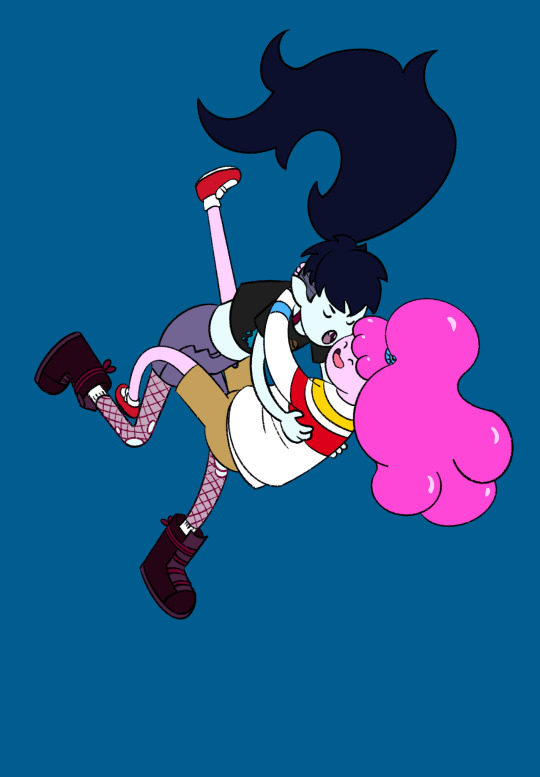
Still getting back into the swing of drawing, so I thought I'd practice with some classic wlw 🩷🖤
#digital art#digital drawing#procreate#artists on tumblr#adventure time#marceline#princess bubblegum#bubbline#fanart#wlw
346 notes
·
View notes
Text
1.15.24
This year has gotten off to the worst start. I'm doing well and drawing more, but yeesh. Week one, some poor kid flips his car all the way through our yard (and both our neighbors yards on either side). He's fine to the best of our knowledge, but it's pretty wild to be laying in bed and then see a car fly by your second story window. Thank goodness for crumple zones! Week two and the entire house is full of Covid. I managed to avoid it for almost four years! Thank goodness for vaccines, but that was worse than any flu I've ever had.
Now I have to go back to work and I'm still fatigued, so we'll see how well I manage to keep up with my socials...
0 notes
Text
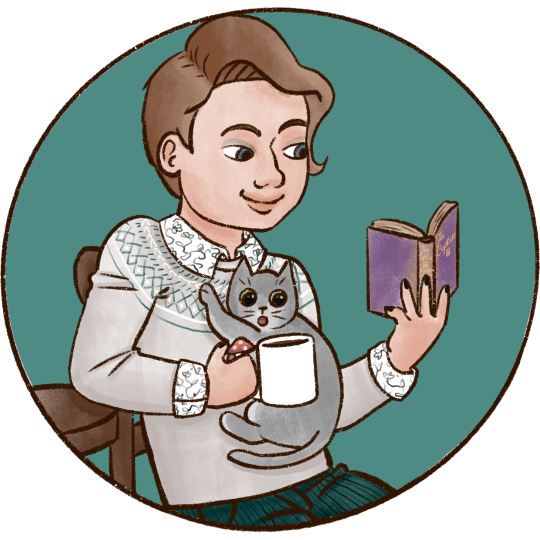
Finished my 2024 self portrait! And added my cat 😺
I've been learning to love my nose more recently and I like how it is in this year's portrait 🩵
[Edit: A friend pointed out that I could make the book a specific book, so I made it the one that my partner got me for my birthday this year.]
1 note
·
View note
Text

I just finished a full rewatch of Adventure Time and remembered how much I love this little guy ❤️
#digital art#digital drawing#procreate#artists on tumblr#adventure time#peppermint butler#baphomet#fanart
43 notes
·
View notes
Text

They're gonna be such a good team lol
She's got the common sense, he's got the go-get-em attitude.
#digital art#digital drawing#procreate#artists on tumblr#original character#Jakre#Avineka#prosthetic#amputee#amputated leg#amputation
2 notes
·
View notes
Text
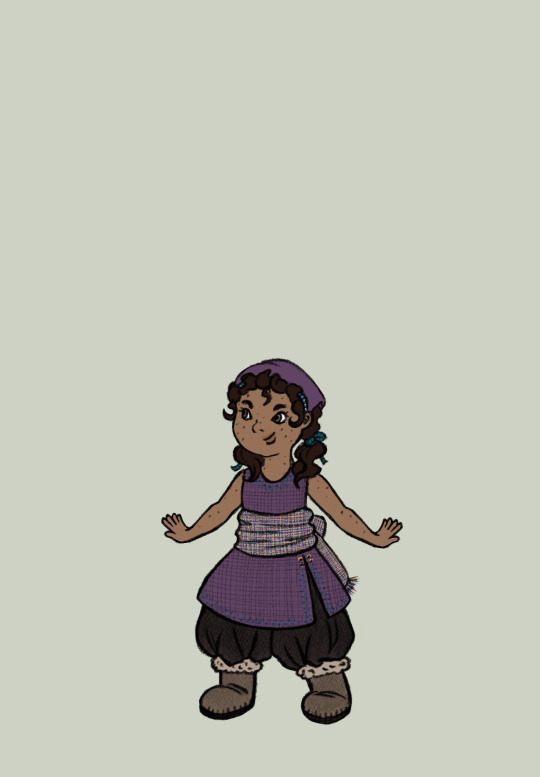
Avineka's future child who I cannot think of a name for yet. Mischievous little thing
2 notes
·
View notes
Text
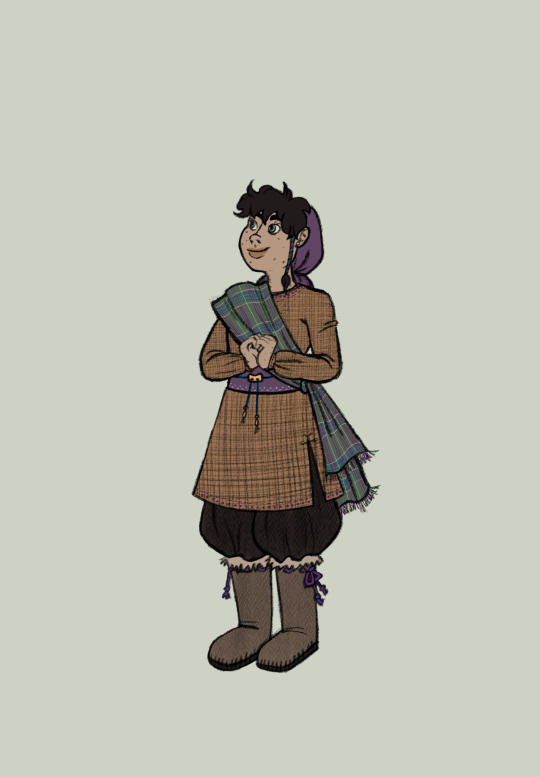
Avineka's youngest daughter, Belaetha. Very sweet, very inquisitive. Now I have to finish designing the two dudes for this family...
#artists on tumblr#digital art#digital drawing#procreate#original character#character design#Belaetha
1 note
·
View note
Text

Avineka's elder daughter, Olanka. She's got a bit of jolly angst to her, but in a fun sporty way!
0 notes
Text
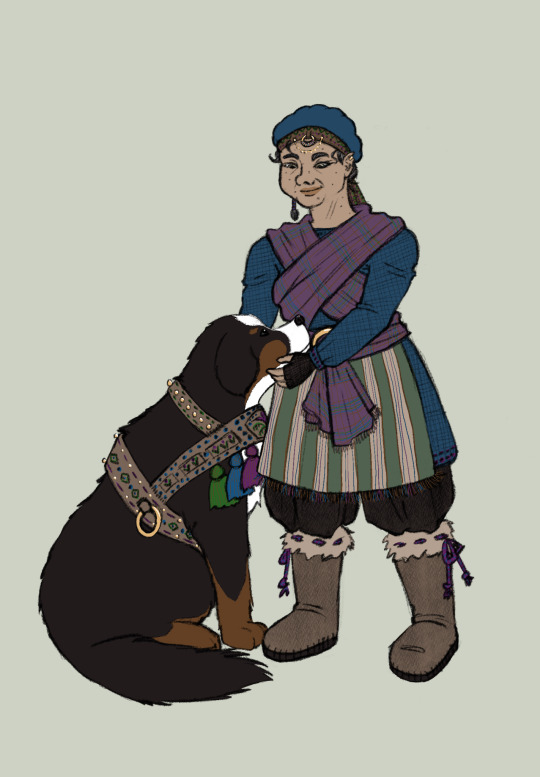
Avineka's mother, Rakesha, and their drafting dog, Yow. He's a big chunky boy and I love him~
#artists on tumblr#digital art#digital drawing#procreate#original character#character design#Rakesha#Yow#dog
1 note
·
View note
Text
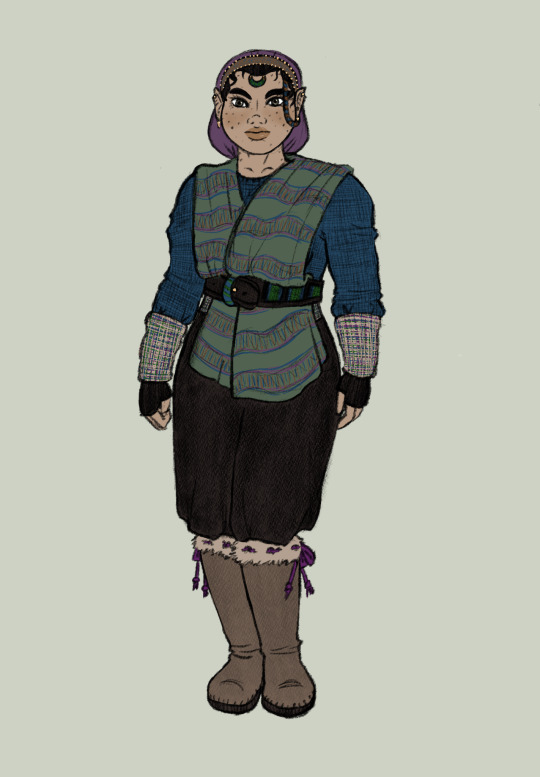
A color design that I'm playing with for a new-ish character. I'm calling her Avineka and she looks quite cozy and warm!
#artists on tumblr#digital art#digital drawing#procreate#Avineka#character design#original character
4 notes
·
View notes
Text




I'm working on some new designs for new characters (and since reworks of old ones). Not sure I'm gonna keep all of these, but I haven't posted in a while so
1 note
·
View note
Text

Playing around with coloring and stuff, having a good time
1 note
·
View note